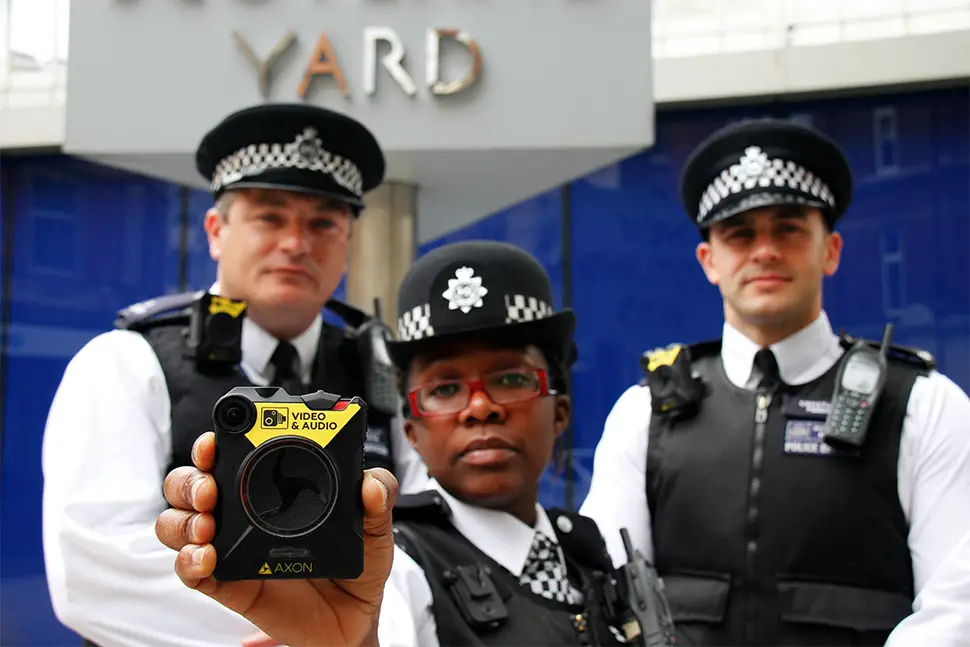
19th October 2016 Large-scale deployment of body-worn cameras for London police The Metropolitan Police Service (MPS) is taking a global lead with what is believed to be the largest rollout of body-worn cameras by police anywhere in the world to enhance the service it gives to London.
This week sees the beginning of a large-scale deployment of Body Worn Video (BWV) which is being issued to more than 22,000 frontline police officers in the British capital. The Met Commissioner, Sir Bernard Hogan-Howe, was joined in Lewisham by the London Mayor, Sadiq Khan, to witness the rollout of the cameras, which follows a successful trial and wide-ranging public consultation and academic evaluation. Over the coming months, cameras will be issued to all 32 London boroughs and a number of frontline specialist roles, including overt firearms officers. The devices have already shown they can bring speedier justice for victims. This has proved particularly successful in domestic abuse cases, which have seen an increase in earlier guilty pleas from offenders who know their actions have been recorded. The technology offers greater transparency for those in front of the camera as well as behind it. Londoners can feel reassured during their interactions with police, whilst allowing officers to demonstrate professionalism in many challenging and contentious interactions, such as the use of stop and search. All footage recorded on BWV is subject to legal safeguards and guidance. Footage from the Axon Body Camera is automatically uploaded to secure servers once the device has been docked, and flagged for use as evidence at court or other proceedings. Video not retained as evidence or for a policing purpose is automatically deleted within 31 days. If the public wish to view footage taken of them they can request, in writing, to obtain it under freedom of information laws. It must be within 31 days, unless it has been marked as policing evidence and therefore retained. The cameras will be worn attached to the officer's uniform and will not be permanently recording. This ensures that officers' interactions with the public are not unnecessarily impeded. Members of the public will be informed as soon as practical that they are being recorded. It is highly visible in any case, with a flashing red circle in the centre of the camera and a frequent beeping noise when the device is activated. The interactive graphic below explains how body worn video will be used.
Mayor of London, Sadiq Khan, said: "Body Worn Video is a huge step forward in bringing our capital's police force into the 21st century and encouraging trust and confidence in community policing. This technology is already helping drive down complaints against officers and making them more accountable, as well as helping to gather better evidence for swifter justice." Metropolitan Police Commissioner, Sir Bernard Hogan-Howe: "Body Worn Video will support our officers in the many challenging situations they have to deal with, at the same time as building the public's confidence. Our experience of using cameras already shows that people are more likely to plead guilty when they know we have captured the incident on a camera. That then speeds up justice, puts offenders behind bars more quickly and most importantly protects potential victims. Video captures events in a way that can't be represented on paper in the same detail – a picture paints a thousand words, and it has been shown the mere presence of this type of video can often defuse potentially violent situations without the need for force to be used." Last month, a study published by the University of Cambridge found that body-worn cameras led to a 93% drop in complaints made against police by the UK and US public, suggesting the cameras result in behavioural changes that ‘cool down’ potentially volatile encounters. A similar study in 2014 found that officers wearing cameras witnessed a 59% drop in their use-of-force, while complaints against them fell by 87% compared to the previous year. The deployment of all 22,000 cameras in London will be managed in a phased approach and is expected to be complete by next summer. ---
Comments »
|








